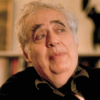Harold Bloom

Harold Bloom
Harold Bloomis an American literary critic and Sterling Professor of Humanities at Yale University. Since the publication of his first book in 1959, Bloom has written more than 20 books of literary criticism, several books discussing religion, and a novel. He has edited hundreds of anthologies concerning numerous literary and philosophical figures for the Chelsea House publishing firm. Bloom's books have been translated into more than 40 languages...
NationalityAmerican
ProfessionTeacher
Date of Birth11 July 1930
CountryUnited States of America
I think that's not reading because there's nothing there to be read,
I saw the Oxford English Dictionary there for the first time.
He is a great artist. He may be the finest artist among American writers since William Faulkner and Henry James. There's the endless variety of modes he works in. His style, his stance, his point of view.
If they wish to alleviate the sufferings of the exploited classes, let them live up to their pretensions, let them abandon the academy and go out there and work politically and economically and in a humanitarian spirit.
What we call a poem is mostly what is not there on the page. The strength of any poem is the poems that it has managed to exclude.
If I were to sum up the negative reactions to my work, I think there are two primary causes: one is that if there is discourse about anxiety it is necessarily going to induce anxiety. It will represent a return of the repressed for a great many people.
I'm talking in the millions. I can't tell you one, two, three or 10. I'm just saying that it's in the millions.
I realized early on that the academy and the literary world alike -- and I don't think there really is a distinction between the two -- are always dominated by fools, knaves, charlatans and bureaucrats. And that being the case, any human being, male or female, of whatever status, who has a voice of her or his own, is not going to be liked.
Real reading is a lonely activity.
I think Freud is about contamination, but I think that is something he learned from Shakespeare, because Shakespeare is about nothing but contamination, you might say.
I take it that a successful therapy is an oxymoron.
I would say that there is no future for literary studies as such in the United States.
In fact, it is Shakespeare who gives us the map of the mind. It is Shakespeare who invents Freudian Psychology. Freud finds ways of translating it into supposedly analytical vocabulary.
Information is endlessly available to us; where shall wisdom be found?